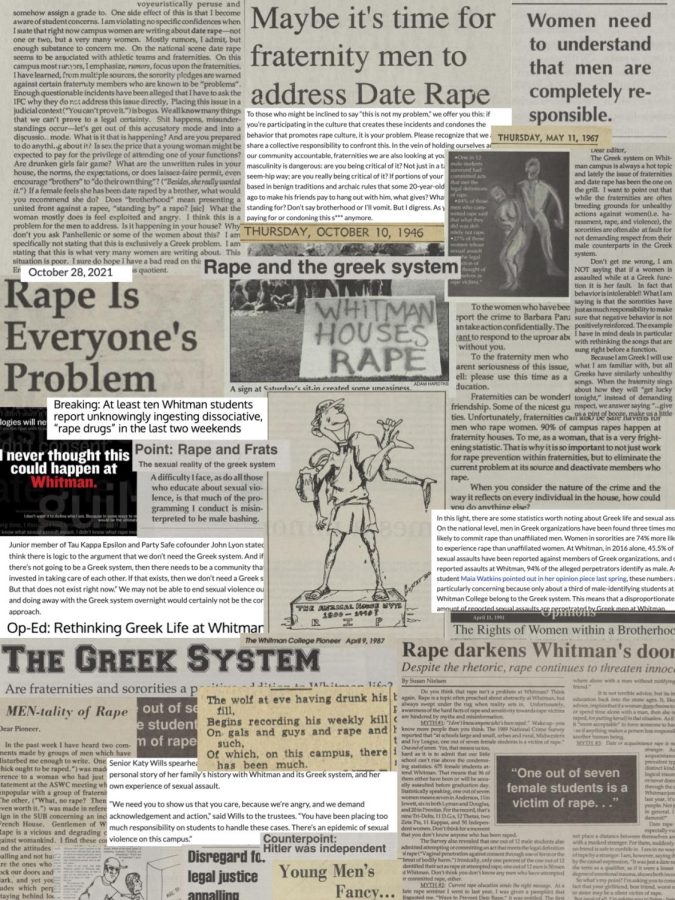I’ve often heard it said that people at Whitman don’t talk about race. It is quite true that an impoverished lexicon for discussions of race and racism exists at our institution, but this is not unique to Whitman––it is a generalized problem typifying political discourse in the United States, in which “race” surfaces to diagnose affective extremity (e.g., racial hatred), suspicious mobilizations of history (e.g., race-baiting) or demographic minoritization (e.g. “the Hispanic vote”). No wonder, then, that even faculty struggle to conceptually separate “race” (the historically contingent, political phenomenon through which categorical differences are ascribed to bodies) from “racism” (the creation or reproduction of structures of domination based on essentialized racial categories).
This reduction of “race” to extreme feeling, historical injustice or markets constrains our possible conversations. Add to this the fear that any discussion of “race” inherently means a discussion of “racism,” and avoidance of race talk makes sense. But avoidance is precisely the problem.
I do not agree that people at Whitman don’t talk about race. By taking exception to this claim, I’m not signaling to the obvious “race talkers” on campus, those politically invested among us, who know we’re talking about race and mean to be. Everyone is “talking about race” all the time, because the way race is coded in the discourses of post-racialism is through other categories. Some of these categories are big, like class, gender, sexuality, culture, religion or nation, and some are “smaller” or more nuanced, such as education, bodily comportment, taste, style, emotional state or use of language. And then there is the constitutive absence of non-whiteness that makes the presumption of whiteness possible, in which ‘race’ as non-white and excluded gives meaning to the whiteness that is always present, always the metric.
In the spirit of instigating difficult conversations, I’ll be polemical. It is too possible not to learn anything about anything other than whiteness at Whitman College. What follows is a letter that Assistant Professor of Art History & Visual Culture Studies Lisa Uddin wrote to Chief Communications Officer Michelle Ma, in response to Ma’s request for faculty feedback. The letter demonstrates precisely how what, on the surface, may not appear to be a conversation about race could productively be read as one that is. What can be gained from reading “unpretentiousness” as post-racial code? As you contemplate Uddin’s words, I encourage you to visualize various members of the faculty, and imagine how your professional respect for each might change were they to comport themselves more “unpretentiously.”
– Assistant Professor of Politics Melisa Casumbal-Salazar
___________________
I wanted to share some emerging thoughts I have about Whitman’s public and campus profile as an “unpretentious” liberal arts college. “Unpretentious” gets used quite a bit in my classroom and elsewhere as a source of institutional identity. I see, for example, that the most recent description on the Whitman College website links Whitman to “an unpretentious Northwest culture.” And while I think I understand its appeal (who wants to be called pretentious, after all? It seems like such an antiquated model of higher education), I would also like to encourage your office, and the college more generally, to rethink its value––particularly at a moment when the school is also trying to diversify its student and faculty body, curriculum [and] world views.
My sense is that the quality of having a lack of pretention is best executed by those who can afford to shed it. I see it coming from a social position of historical power and exercised most vigorously by people who are interested in disassociating themselves from that power.
But recognizing that people in the Whitman community come from different backgrounds (cultural, class, ethnic, etc.) entails asking how being casual, natural [or] unpretentious may not work equally across the board. Relinquishing a certain formality in this environment suggests you feel safe enough to do so, which is simply not the case for some. Sustaining a campus culture that encourages said informality may even feel vaguely menacing, reinforcing some of the inequalities that Whitman is invested in dismantling. I don’t know if this is the case for students as much as select faculty (me on occasion, for example!) who register a certain risk in being “unpretentious,” or who simply have trouble identifying with its virtues. I wonder if there are other adjectives that could reflect Whitman with more sensitivity and, frankly, accuracy.
– Assistant Professor of Art History & Visual Culture Studies Lisa Uddin+

